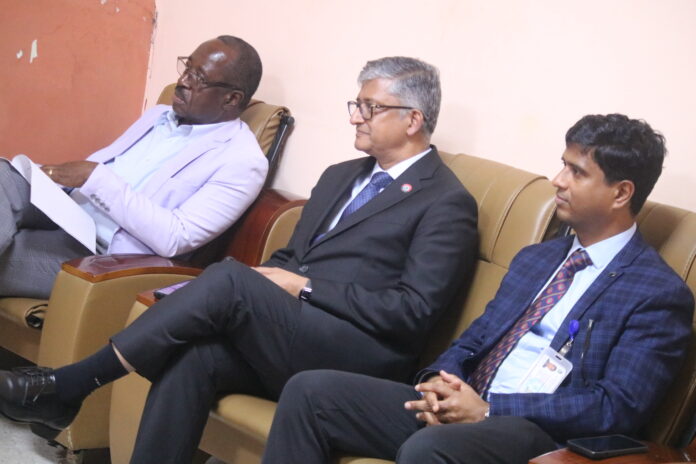Monrovia – The Liberia Eye Center at the John F. Kennedy Medical Center is fast becoming a beacon of specialized healthcare in West Africa, following a landmark visit that brought together officials from the Liberian Ministry of Health, the JFK administration, and international partners led by Dr. Prashant Garg, Executive Chairman of the L.V. Prasad Eye Institute (LVPEI) in India.
The visit, described by stakeholders as both strategic and forward-looking, was not merely ceremonial. It marked a renewed commitment to strengthening collaboration, expanding services, and charting the path for Liberia to become a regional hub for advanced eye care.
A Journey of Transformation
Since its inauguration on July 24, 2017, the Liberia Eye Center has recorded milestones that many describe as “transformational.” These include: 100,000 outpatient visits (October 2024) 10,000 eye surgeries completed (May 2025). 50 successful corneal transplant surgeries (July 2025). Graduation of Liberia’s first fellowship-trained vitreoretinal surgeon (December 2024). Establishment of a Vitreo-retinal surgical unit (June 2023). Launch of Liberia’s first optical laboratory to produce eyeglasses locally (July 2024) Full accreditation by the WestAfrican College of Surgeons for membership and fellowship training (August 2025)
Equally important are the steps taken to build a sustainable ecosystem for training, outreach, and innovation. In 2018, the center launched Liberia’s first competency-based residency program in ophthalmology, emphasizing both clinical excellence and surgical professionalism. That same year, a school screening program was rolled out nationwide, connecting children in classrooms to treatment facilities. By 2019, Liberia had its first microsurgical wet-lab, giving trainees a safe environment to practice delicate procedures.
Speaking on the evolution of the center, Dr. Garg highlighted that the Liberia–India partnership is anchored not just in service delivery, but in building systems and capacity that will endure. Over the past eight years, 25 subspecialty faculty from India—including experts in cornea, retina, glaucoma, pediatric ophthalmology, and ocular oncology—have visited Liberia to train doctors and manage complex cases.
“The idea has always been to hand over the center to a well-trained, confident team of Liberians in the near future,” Dr. Garg explained. “We are not just treating patients; we are developing a model of care, training, and outreach that other countries in West Africa can replicate.”
Already, local ophthalmologists trained under this system are graduating and filling critical roles. Nurses and mid-level professionals are also being trained to handle cataract surgeries and routine eye care, reducing dependence on foreign specialists.
The Liberia Eye Center has paired its core services with nationwide outreach, reaching 13 of Liberia’s 15 counties through school screenings and community eye health programs. These initiatives target underserved populations—rural residents, children, and the urban poor—ensuring that specialized care is not limited to Monrovia.
To bridge geographic barriers, the center has also introduced teleconsultations, allowing health workers in remote areas to access specialist advice in real time. “No health worker in Liberia should feel isolated when handling a complex case,” one official said, emphasizing how digital systems are enhancing both speed and safety in treatment.
Liberia’s Place in a Continental Movement
Across Africa, partnerships in Ghana, Nigeria, Ethiopia, and Kenya have demonstrated how international collaborations can transform eye care by developing entire systems, not just isolated skills. Liberia is now positioning itself within this movement, with JFK serving as the referral hub for advanced care, while smaller centers handle routine cases. This referral model—widely used globally—ensures patients receive appropriate care at every level, while maximizing limited resources.
What sets Liberia apart, observers note, is the sophistication of the Eye Center’s infrastructure. It is now one of the most advanced ophthalmic facilities on the West African coast, attracting not only local patients but also complex referrals from neighboring countries.
The Ministry of Health and JFK administration have expressed strong support for scaling up eye health services. Officials believe that with growing political will, returning specialists, and a motivated local workforce, Liberia is poised to establish a benchmark for West Africa.
Challenges remain, particularly in sustaining resources and expanding the pool of specialists. Yet the progress made—from training local surgeons to delivering tens of thousands of treatments—offers proof that strategic partnerships and disciplined training can transform healthcare systems.
The Liberia Eye Center today stands as more than just a medical facility. It is a symbol of resilience, innovation, and hope. From humble beginnings, it has evolved into a national asset that demonstrates how focused investment in specialized care can change lives at scale.
For Liberia, this is not just the story of an eye hospital. It is the beginning of a broader healthcare movement—one that may well inspire countries across Africa to reimagine what is possible in specialized medicine.



